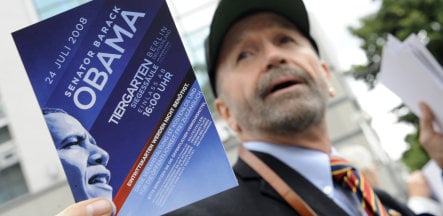Is it an inappropriate campaign stop on foreign soil, or simply a sign that the challenges facing America these days are of a global nature?
Regardless of your take on the matter, Barack Obama’s visit to Berlin this week has certainly kicked up a ruckus on both sides of the Atlantic.
Whereas some antagonistic US pundits have vocally tried to tell the Illinois senator that presidential candidates traditionally have left politics at America’s shores, a few rankled German commentators and politicians have accused him of trying to hijack Germany’s most potent national symbols for his own political gain.
After German Chancellor Angela Merkel apparently signalled her disapproval of an appearance in front of the Brandenburg Gate for what she deemed an overseas campaign rally, Obama’s team quickly settled on the nearby Victory Column located at the heart of Berlin’s central Tiergarten park.
There will be no iconic backdrop of the landmark associated with the peaceful revolution leading to German reunification – Obama’s campaign team now has to be content with TV images showing a monument to Prussian military victories in the 19th century.
Adored by thousands
But when the presumptive Democratic presidential nominee arrives in the German capital on Thursday he’ll still be assured a rapturous welcome by a country eager to start a new chapter in transatlantic relations. His scheduled “major” foreign policy speech – likely to be given to an adoring audience of thousands – is already being compared in Germany to the famous Berlin addresses of John F. Kennedy and Ronald Reagan even though he hasn’t yet uttered a word.
Of course, much of Obama’s appeal to Germans simply lies in him not being George W. Bush. The public here has for years so loathed the current man in the White House that even Obama’s elderly Republican challenger John McCain looks fresh and new. But for most Germans it’s Obama who holds the promise of a cleaner break with the Bush administration’s most-disliked policies.
Bush’s decision to go to war in Iraq, his perceived backwardness on global warming and preference for seemingly arrogant unilateral action over the past eight years has left America’s reputation in tatters in Germany. And while that might have been traumatic for the Americans living in the country, it’s been at least as equally distressing to the Germans.
America was supposed to be the country that magnanimously defended decency and democracy around the world, not a place that started questionable wars and dragged its feet on pressing environmental issues while the polar ice caps melted.
Bush jarred Germany from its happy Yankee daydream, which is perhaps why so many Germans are such enthusiastic Obama backers – they’re desperate for him to reassure them America is the good place they’ve always believed it to be. Intelligent, charismatic and best yet – apparently interested in what they have to say – Obama pushes all the right buttons for the Germans.
It’s no wonder a recent survey by pollster TNS Forschung showed a massive 76 percent of Germans considered Obama the better candidate for the US presidency. A mere 10 percent picked McCain.
Problems on the horizon
But will the German love affair with Obama last? Already there are problems looming on the horizon.
Obama has said he wants to redeploy US forces from Iraq to Afghanistan. But he also wants NATO allies like Germany to shoulder a bigger burden in the fight against the Taliban and al-Qaida. However, several German politicians are already trying to pre-empt any demands for Germany to increase its troop levels or send its soldiers into dangerous combat missions in the south of the country.
That certainly doesn’t sound much like the “unlimited solidarity” Berlin professed shortly after the terrorist attacks of September 11, 2001. Back then, very few in Germany questioned that military intervention in Afghanistan was necessary – even the pacifist Green party backed sending troops as part of a NATO mission. However, only a few years later there was overwhelming opposition in Germany to the US-led invasion of Iraq.
Unfortunately for both German leaders and Obama should he become president, the Bush administration has succeeded in melding the two conflicts in Afghanistan and Iraq to the point where most Germans can no longer distinguish between them. The Bush strategy of labelling both part of the war on terror has worked, but with the unintended consequence of sapping German support for the fight in Afghanistan rather than bolster backing for action in Iraq.
Is Obama’s admittedly powerful charisma enough to woo both the German government and public? Can he explain why Berlin should risk having more German soldiers come home from Afghanistan in coffins? Can he distinguish between the “good” war in Afghanistan and the “bad” war in Iraq?
Or will Germany’s Obamania simply reach its highpoint this Thursday afternoon in Berlin?




 Please whitelist us to continue reading.
Please whitelist us to continue reading.